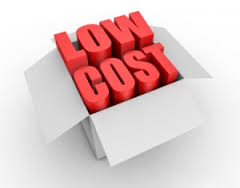记忆方法
将“cheap”想象为“cheaper”,即“更便宜的”,它是由“cheaper”变化而来,因此记住它表示的是价格低廉。可以将其与“便宜货”的情景联系起来帮助记忆。
以上内容由AI生成, 仅供参考和借鉴
中文词源
cheap 便宜的
来自拉丁词caupo, 小商人,叫卖者,后来词义贬义化。其原词义见Copenhagen, chapman.
英语词源
- cheap
-
cheap: [16] The adjectival use of cheap in English is quite recent, but the word itself goes back a long way. Its ultimate source is the Latin noun caupō ‘tradesman’, which was borrowed into Germanic in prehistoric times. Among its descendants were German kaufen ‘buy’, Old English cēapian ‘trade’ (the possible source of chop, as in ‘chop and change’), and the Old English noun cēap ‘trade’.
In Middle English times this came to be used in such phrases as good chepe, meaning ‘good bargain’, and by the 16th century an adjectival sense ‘inexpensive’ had developed. The original sense ‘trade’ is preserved in the personal name Chapman, which until the 19th century was an ordinary noun meaning ‘trader’ (it is the source of chap ‘fellow’).
=> chap, chop - cheap (adj.)
- "low in price, that may be bought at small cost," c. 1500, ultimately from Old English noun ceap "traffic, a purchase," from ceapian (v.) "trade," probably from an early Germanic borrowing from Latin caupo "petty tradesman, huckster" (see chapman).
The sense evolution is from the noun meaning "a barter, a purchase" to "a purchase as rated by the buyer," hence adjectival meaning "inexpensive," the main modern sense, via Middle English phrases such as god chep "favorable bargain" (12c., a translation of French a bon marché).
Sense of "lightly esteemed, common" is from 1590s (compare similar evolution of Latin vilis). The meaning "low in price" was represented in Old English by undeor, literally "un-dear" (but deop ceap, literally "deep cheap," meant "high price").
The word also was used in Old English for "market" (as in ceapdæg "market day"), a sense surviving in place names Cheapside, East Cheap, etc. Related: Cheaply. Expression on the cheap is first attested 1888. Cheap shot originally was U.S. football jargon for a head-on tackle; extended sense "unfair hit" in politics, etc. is by 1970. German billig "cheap" is from Middle Low German billik, originally "fair, just," with a sense evolution via billiger preis "fair price," etc.
权威例句
- 1. We will end up living in a society where life is cheap.
- 我们最终将生活在一个视人命为儿戏的社会。
- 2. Calls cost 36p (cheap rate) and 48p (peak rate) per minute.
- 电话每分钟36便士(优惠费率)和48便士(高峰费率)。
- 3. Cheap goods are available, but not in sufficient quantities to satisfy demand.
- 有一些廉价的商品,但是数量不足以满足需求。
- 4. A cheap table can be transformed by an interesting cover.
- 一块趣味盎然的桌布就能使一张廉价桌子面目一新。
- 5. Some of the finer type-faces are corrupted by cheap, popular computer printers.
- 有些比较优美的字体经过价廉、通用的电脑打印机处理后就面目全非了。

